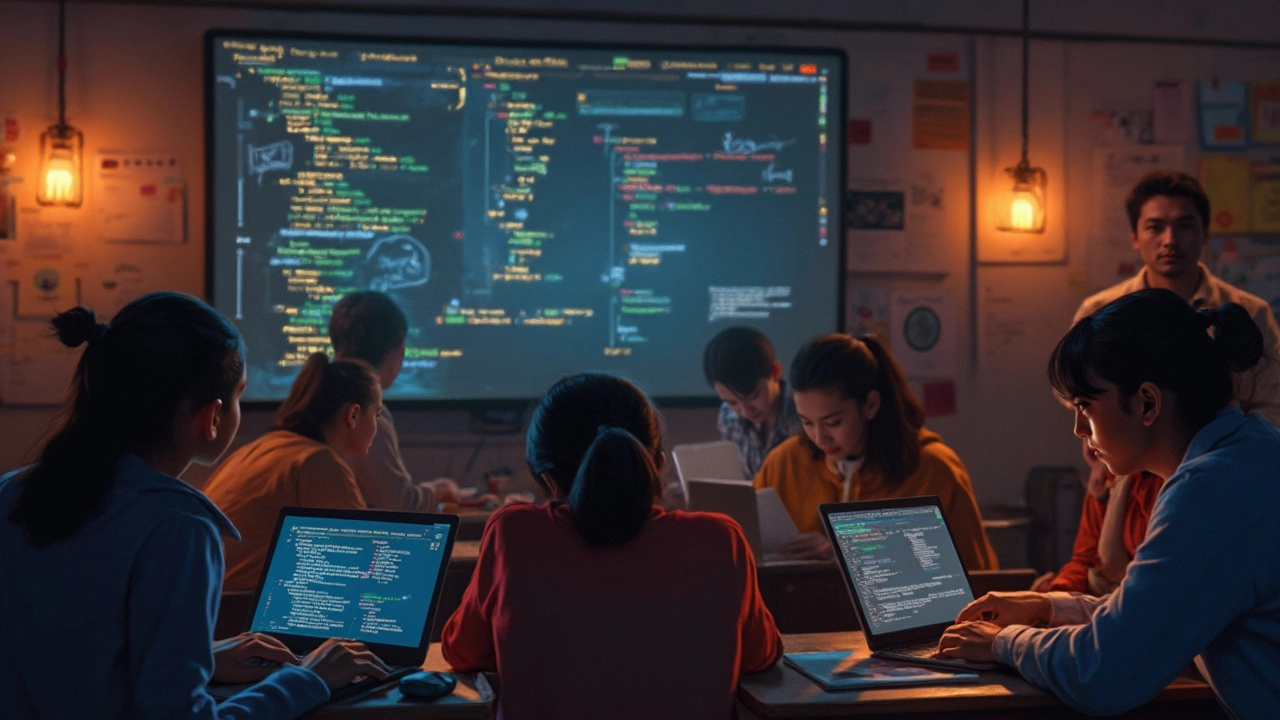This is a bit like being handed a 1000-piece jigsaw puzzle—without the picture on the box. People say anyone can code. But when you sit down at your computer, ready to change the world with lines of code, reality smacks you right in the face. It's not just about typing syntax or copying tutorials. There’s one thing that seems to trip up almost everyone: truly understanding how to turn a messy idea into code that actually works. That's the real mountain. Mastering code isn’t just about learning a programming language, it's about thinking like a programmer. It's the paradox that keeps Oxford’s libraries full of over-caffeinated students clutching Python textbooks and JavaScript cheat sheets.
The Real Skill: Turning Ideas into Logic
The biggest beast in learning programming isn’t memorizing for-loops or semicolons. It’s translating what’s in your head into something a computer actually understands. People often hit a wall when they realise you can’t just tell your laptop, “make a weather app,” and expect it to do the rest. Computers are literal. They only do what you spell out, step by tiny step. This means the hardest part is developing a problem-solving brain. It's breaking a large goal into tiny, precise instructions, then ordering those steps so nothing falls through the cracks. For example, if you want to find students who passed a test, you first need to understand how to represent each student in code, how to record their scores, then write logic that checks which scores are above a certain threshold. Sounds easy, right? But dozens of decisions pop up: How do you handle missing data? What if some students have multiple scores? Suddenly, your plan balloons in complexity.
This is where people stall—when their code “almost works,” or even runs perfectly half the time but crashes on some weird input the teacher forgot to mention. You’ll see experienced coders scribbling flowcharts or muttering, “What am I missing here?” around the High Street coffee shops. That’s because real-world code isn’t about solving one tiny problem. It’s juggling hundreds of little decisions, keeping everything in your head at once. Oxford’s own introductory programming course found that more than 60% of students said the trickiest part wasn’t learning the language; it was figuring out how to put instructions together in a logical, reliable way.
There’s a name for this miserable middle step: computational thinking. It’s part logic puzzle, part storytelling. You need to imagine how a computer 'thinks'—which is nothing like a human. The more you do this, the better your code. But, let’s be honest, it hurts your brain in the beginning. That’s why you can ace all the syntax quizzes and still get stuck on real problems. A classic mistake? Focusing on learning 'cool' frameworks without really understanding how core programming logic fits together. It’s like decorating a cake without knowing how to bake one. If you want practical tips to get past this logic barrier, try explaining your plan to someone else, out loud. It’s called rubber duck debugging but works just as well with an actual friend. The more you practice, the easier it gets. Start solving small problems, and don’t skip the basics, no matter how tempting flashy technologies might look.

Taming Bugs: Why Debugging Feels Impossible
Imagine you’ve got your code working—but a weird bug makes it crash for some users. Debugging is the true test of patience in programming. Everyone hits this wall, from first-year students to Oxford professors working on crazy AI projects. The hardest thing? You need to think like a detective. Computers won’t tell you where your logic broke down. All you see is a vague error message. Sometimes, no error at all—the output is just wrong. Debugging drains even the biggest egos. It’s where you realise you can’t “wing it” anymore; now, you’re forced to step through your thinking, line by line, and consider all the possible things that might go sideways.
A 2023 Stack Overflow developer survey said more than 50% of professional coders spend at least a third of their week just fixing bugs. Sounds brutal, but it makes sense. Even the smallest typo, a stray character, or a bad assumption about data can mess up everything. One story that floats around Oxford CS classes: a team spent two days hunting a bug, only to find they’d used an equals sign instead of a double-equals in a comparison. Sometimes, debugging feels less like programming and more like slowly losing your mind. But it’s honestly where you grow most as a coder. Each bug forces you to really learn how your code works—and often, how it doesn’t.
People who get good at debugging don't just blindly try random fixes, hoping something will stick. Instead, they learn to read stack traces, add print statements, or even work backwards from the bug to the last thing that changed. The best advice I’ve heard is: when you hit a bug, don’t panic or rage-type into Google. Slow down. Step away from the computer for a bit. Come back and retrace your program, just like solving a murder mystery. Keep it methodical. If something doesn’t make sense, comment it out and see what changes. Tools help, too—learn to use integrated debuggers or version control so you can roll back mistakes. Here’s a neat fact: big-time companies like Microsoft and Google actually run 'bug bounty' programmes, rewarding anyone who finds a security bug in their products. Debugging is so important, they’ll literally pay outsiders to do it!
Of course, there’s no magic shortcut. Debugging sharpens your eye for detail. You start to predict the kind of mistakes you make again and again. Some pros actually keep a notebook of “weird bugs I’ve seen,” because odds are, that bug will pop up again. You’ll spot patterns: data types mixed up, off-by-one errors in loops, missing edge cases. The earlier you catch these, the less painful they become. A key thing: resist the urge to fix a bug without understanding WHY it happened. That’s the difference between a beginner coder and a real developer. Remember, every legendary programmer has horror stories of losing an entire weekend to a bug that turned out to be a missing comma. Wear those scars with pride—it means you’re levelling up.

The Other Obstacles: Fear, Focus, and Keeping Up
Once you get a bit of confidence writing code and tackling bugs, there’s another sneakier challenge: wrestling with your own brain. Coding is hard not just because of logic puzzles or nasty bugs. Sometimes, it’s a struggle just to sit down and stay focused. It’s tempting to think you need to know every new tool or framework, or that everyone else is picking things up faster than you. Imposter syndrome hits nearly everyone. Even top tech figures admit, off the record, that they still Google basic questions sometimes. Remember when Adam D’Angelo, CEO of Quora, revealed he still checks Stack Overflow for common bugs? Nobody knows it all.
Attention span is the next hurdle. Programming can demand hours of focus. Especially with social media, phone notifications, or just the anxiety that someone’s solved the problem faster than you, it’s easy to procrastinate. The trick is to build habits. Set actual goals for your sessions—something specific, like "write code to sort a list", instead of just "learn Python." Take breaks. The Pomodoro technique (25 minutes on, 5 minutes off) isn't just trendy—studies at Cambridge actually showed it can improve learning for complex tasks like coding. Your brain needs downtime to make sense of all the logic gymnastics.
Another trap? Getting stuck in tutorial hell. You feel productive, but you’re just following instructions without getting your hands dirty. It’s much better to build something, even if it’s small—and broken. Learning is messy. Oxford professors love to set cheeky assignments with twists, forcing students out of their comfort zones. You can't just pass exams by memorising syntax; you have to confront the limits of your own knowledge. Don't be scared to fail. Hit the wall, get frustrated, then persevere. That’s where the real learning happens. Here’s a small hack: if you’re unclear what to build, try recreating a tool you use every day. Maybe a tiny to-do list app, or a website that tracks your tea brewing times (hey, it’s an Oxford thing).
And finally, let’s talk about keeping up. Tech changes every five minutes—or feels like it does. But the fundamentals of coding, the logic stuff, hasn’t changed since the first computers in the 1950s. Don’t panic if you don’t know every buzzword. The hardest thing to learn in coding is how to think. That hard-won muscle of breaking down problems and thinking clearly translates to any language or tool. Focus on solving problems, not memorising tricks. Enjoy the journey. Ask for help. Join coding meetups or online forums. There’s a reason so many great coders hang out in groups—talking through a problem often makes the answer much clearer. And nothing beats the buzz of finally cracking something tricky after hours of wrestling with it.
| Common Coding Challenges | Why They're Hard | Tip for Overcoming |
|---|---|---|
| Translating ideas into logic | Requires breaking down abstract problems into code steps | Draw flowcharts or explain out loud |
| Debugging | Bugs can hide in small mistakes; unclear error messages | Work methodically, learn to use debuggers |
| Staying focused | Programming needs deep concentration, frequent frustration | Use time blocks and take breaks |
| Dealing with new tools | Tech evolves rapidly, can feel overwhelming | Master fundamentals, not just frameworks |
| Imposter syndrome | It's easy to compare yourself to others in the field | Remember everyone learns by failing |
